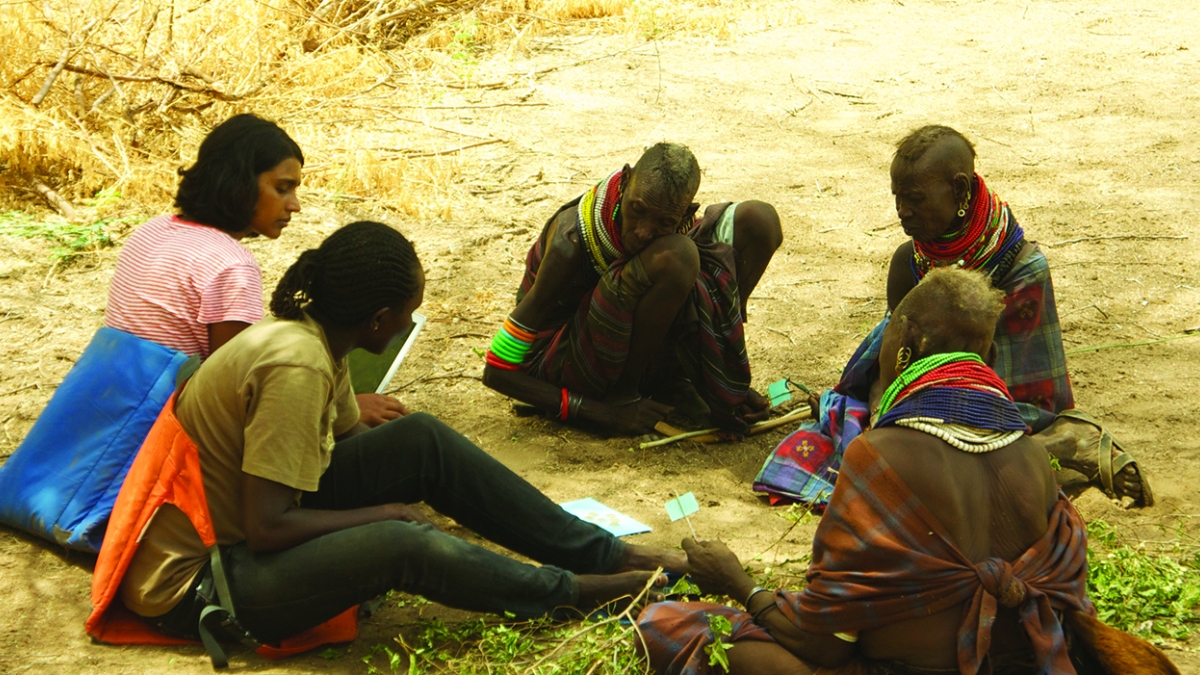Reciprocal cooperation is not just a game

Sarah Mathew meets with members of the Turkana community. Image courtesy Sarah Mathew.
Humans are unusual because we cooperate with each other in ways that other animals do not. Cooperation can be a messy venture, with many strategies in play because individuals are prone to self-serving actions. Humans seem better able to solve these problems, but it is not certain why.
Arizona State University researchers Sarah Mathew and Robert Boyd have published new research in Nature Human Behaviour that puts forth a new explanation for why reciprocity plays a prominent role in human cooperation and why it is so rare in other animals.
It has to do with adjudication by third-party observers to help resolve errors in perception — disagreements between social partners about what transpired. In human life, it is not just the fact that someone has been wronged, but potentially, the fact that the person feels like they have been wronged, even though they have not.
Mathew and Boyd designed a new strategy — “ATFT” or “arbitration tit-for-tat” that was studied using evolutionary game theory. It seeks the opinion of a third-party “arbitrator” when partners have a misunderstanding. They show that ATFT can persist and perform well against different existing reciprocity strategies. ATFT is notably better than current strategies at sustaining cooperation when disagreements are common occurrences.
Existing theory indicates that behavioral errors undermine reciprocity because it leads to continuing misunderstanding and recrimination. By relying on a public, third-party opinion to align both players’ beliefs, cooperation is reestablished during game play, even when arbitration errors frequently arise.
In other animals, evidence for reciprocity is sparse, though many species live in social groups, interact repeatedly over time and seem to have the cognitive ability to adjust their current behavior on another’s past actions. This is precisely the conditions that should favor reciprocity, but there is no avenue for remedying errors in perception.
Human reciprocity differs from that of other species because people live in societies regulated by shared, culturally transmitted moral norms.
“In small-scale village societies, people are intensely interested in, and aware of, each other’s affairs and help to mediate interpersonal conflict and adjudicate disputes between well-known individuals,” said Mathew, a research affiliate with the Institute of Human Origins and an associate professor in the School of Human Evolution and Social Change.
Their research notes evidence from “group talking” among the Ju/’hoansi (!KungA member of a people of southern Africa —usually preceded in writing by ! (via Merriam Webster)) foragers of Botswana, community discussion among Turkana pastoralists on who have violated norms, and discussion around kava drinking sessions in Fijian villages to lay out motives, opinions and interpretations of the conflicts.
“Humans are a different kind of animal because we depend on nongenetic, cultural inheritance. Cultural evolution is much faster than genetic evolution, and this allows human populations to evolve solutions to local environments,” said Boyd, a research affiliate with the Institute of Human Origins and professor in the School of Human Evolution and Social Change.
These cooperative strategies use judgments that allow reciprocity to evolve and persist even when errors are quite common and the judgments are inaccurate, giving rise to qualitatively novel — and distinctly human — kinds of social behavior.
This research was published as “Arbitration supports reciprocity when there are frequent perception errors,” in Nature: Human Behavior, Robert Boyd and Sarah Mathew.
More Arts, humanities and education

Grand Canyon National Park superintendent visits ASU, shares about efforts to welcome Indigenous voices back into the park
There are 11 tribes who have historic connections to the land and resources in the Grand Canyon National Park. Sadly, when the…
ASU film professor part of 'Cyberpunk' exhibit at Academy Museum in LA
Arizona State University filmmaker Alex Rivera sees cyberpunk as a perfect vehicle to represent the Latino experience.Cyberpunk…

Honoring innovative practices, impact in the field of American Indian studies
American Indian Studies at Arizona State University will host a panel event to celebrate the release of “From the Skin,” a…